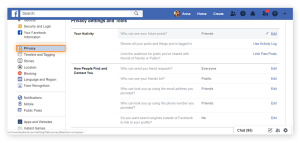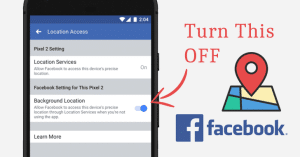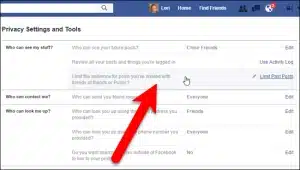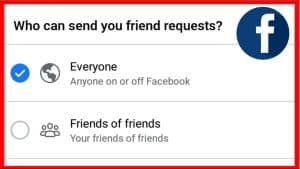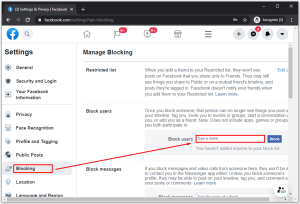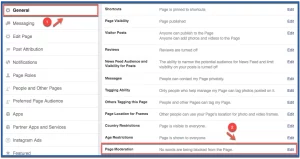Facebook Parental Controls: Must-Know Parental Control Tips and Tricks
With over 3 billion users across the world, Facebook has become part and parcel of our daily lives. But with its meteoric rise comes increased levels of scrutiny and fears for the online safety of children everywhere. It’s, therefore, crucial that parents fully understand how they can help safeguard their children against the various threats that it could pose.
Thankfully, there are Facebook parental controls you can use, including making all the profiles of users under 18 private, meaning only friends and friends-of-friends can see the poster’s profile. For more advanced coverage, we’d suggest using a parental spy app such as mSpy, which allows you to monitor all of your children’s social media accounts in one place. In this article, we’re going to give you some of the top tips and tricks to help you keep your child safe when using Facebook.
-
- 1. Check Privacy and Security Settings
- 2. Disable Location Tracking
- 3. Enhance Password Security and Login Measures
- 4. Limit Audience for Your Child’s Posts
- 5. Manage Profile Visibility
- 6. Regulate Screen Time
- 7. Monitor and Control Contacts for Your Kids
- 8. Report Users Engaging in Inappropriate Behavior
- 9. Block Troublesome Users
- 10. Restrict Access to Inappropriate Games and Websites on Facebook
- 11. Control Content Exposure on Facebook
- Is Facebook Dangerous For Young Kids?
-
- 1. Check Privacy and Security Settings
- 2. Disable Location Tracking
- 3. Enhance Password Security and Login Measures
- 4. Limit Audience for Your Child’s Posts
- 5. Manage Profile Visibility
- 6. Regulate Screen Time
- 7. Monitor and Control Contacts for Your Kids
- 8. Report Users Engaging in Inappropriate Behavior
- 9. Block Troublesome Users
- 10. Restrict Access to Inappropriate Games and Websites on Facebook
- 11. Control Content Exposure on Facebook
- Is Facebook Dangerous For Young Kids?
What Security is in Place On Facebook?
Despite needing to be 13 to create a Facebook account, the social media giant has no way of actually verifying the age of the account creator, so it’s often up to parents to impose some restrictions. Here are some of the core safeguarding tools you can use on Facebook:
- Passwords — The initial level of Facebook security and privacy is setting a password to safeguard your account and prevent hackers from accessing your personal details and profile, so by using a strong password, you’re covered on the first step.
- Using Two-Factor Authentication — This is another privacy and security tool on Facebook. Every time a new device is used to log into your account, a login approval code is required and sent to your device.
- Account Alerts — When a user logs in from a new device or when there’s suspicious activity taking place in the account, Facebook sends notifications to the account owner.
- Information Request — Facebook values the security and privacy of its users. Therefore, when a request for user information is made, Facebook pushes back or notifies you if the situation permits it.
- Safe Browsing — This is another privacy and security safeguard that serves as a means of preserving user data. Your actions on the app or website are encrypted and can’t be seen by anyone else without your consent.
How to Set Up Parental Controls On Facebook
Next, we’re going to run through how you, as a parent, can check the privacy and security settings on your child’s account. Just follow these simple steps:
1. Check Privacy and Security Settings
This setting allows you to control who can see, comment or share a particular post. For children whose profiles say they’re under 18, this is set to “Friends” and “Friends of Friends” only. However, as Facebook can’t verify ages, it’s good practice to check this yourself. Here’s what to do:
- Click on the menu option in the top right-hand corner of the screen, and scroll down until you see the Privacy tab.
- Here, you’ll see who has access to your child’s account and posts and how others can reach them on Facebook (by friend request, email address, or phone number.)
- Additionally, you can secure the account by changing the password and activating notifications.
2. Disable Location Tracking
Facebook users can share their current location with their friends or in posts, and the Facebook parental control settings can be started by disabling this. Only Facebook app users on iOS and Android smartphones have access to the Facebook location service.
Disabling on Android:
- On the home screen of the smartphone, select “setting.”
- Select “Apps” and then “Facebook.”
- From there, select “permission” and then “location.”
- There are three choices: ask each time, don’t ask, and allow only when using the app.
- Pick the solution that best suits your needs.
Disabling on iOS:
- You can access “location service” from the home screen.
- Toggle the location switch on or off.
- By scrolling through the apps under “location service,” you can customize the setting.
- Click on “Facebook” to set it as your preferred option
If you want to track your child’s location on iOS, you can always use one of the market’s top spy apps for iPhones, where you can create your own customized safe zones for your child and get alerts when they enter or leave these designated areas.
3. Enhance Password Security and Login Measures
Having a strong password will secure an account and stop unwanted access — hence why many opt to use a leading password manager to generate and store all of their passwords — which is especially helpful for parents looking to manage their children’s online accounts.
A hack can mean someone accessing everything there is about your child online and on their devices just by gaining access to their Facebook account.
Another good way to enhance security and login measures is to set up Two-factor Authentication, which means you receive a code to a registered device or email address. You’ll need to enter in order to log in, so make sure it’s an up-to-date number or email.
If you don’t know the account password or forget the new one, just click ‘Forgot Password’ and follow the prompt. Here’s how you do it:
- In the top-right corner of the Facebook app, tap the menu symbol.
- Go to “settings and privacy” by scrolling down, and click “Settings.”
- Choose “password and security” and then “tap change password.”
- Enter the current password on the account.
- To verify the new password, type it again to ensure it matches.
- To save the changes you’ve made, select “save changes.”
4. Limit Audience for Your Child’s Posts
You can restrict who can view your child’s posts, both past and present, using these settings. You can either set this to all posts or older posts to limit who can see them.
For a Single Past Post:
- In the top right corner of the Facebook app, tap the menu option.
- Find the post you want to edit by scrolling down.
- At the upper right of the post, click the three-dot. Then click “change audience.”
- Change the post’s visibility to only me, friends, or the general public.
To Restrict Who Can See All Past Posts:
- Choose “settings” from the menu.
- In the “Audience and visibility” section, scroll down and click “posts.”
- Click “Limit who can view previous posts.”
- Select “limit old posts” and then confirm your selection.
To Restrict Who Can See the Present Posts:
- Select “settings,” and then “audience and visibility.”
- Click on “profile and tagging.”
- Select “who can see what others post on your profile.”
- Decide on a target audience and confirm the location.
5. Manage Profile Visibility
Follow these steps to ensure only the people who need to see the profile can:
- Tap the top-right corner of the Facebook app to access the menu. To view your profile, tap your name.
- Click on “see more about yourself” and then “contact info.”
- To change who can change a phone number, email address, website, or address, tap “add.”
- To choose a different audience for your profile, use the drop-down menu and select an option that suits you.
- The profile can also be locked. On these, the shared stories, cover photos and photo posts are only visible to friends.
- The previous post’s privacy setting will be changed to friends.
6. Regulate Screen Time
With this setting, you can restrict or schedule screen time for your child to ensure a healthy digital balance. Do this by:
- At the top-right of the Facebook app, tap the menu (three horizontal lines).
- Then select “settings and privacy.” In the “settings” menu, choose “your time on Facebook.”
- Navigate to “manage your time” and select “see tools.”
- To activate the quiet mode or set a screen timer, toggle the switch next to it.
- To the daily time reminder, click “Next.”
- Set the reminder after selecting the duration.
7. Monitor and Control Contacts for Your Kids
To make sure nobody unwanted can contact your children, you can control who has access to their profiles and who can send them messages:
- Go to the “Privacy” tab within the settings pages, and locate “How people find and contact you.”
- Then, you’ll see a list of options, starting with “Who can send you friend requests.”
- Change them all to “friends” or “friends of friends” to stop strangers from contacting them.
8. Report Users Engaging in Inappropriate Behavior
If something or someone doesn’t look right, you can report it to Facebook, which will then review and remove it. This is something you might be compelled to do if you find someone is talking inappropriately with your child or that they’re posting concerning content online.
- Go to your feeds (search for them) and click on the user you wish to report.
- In the top right corner, click the “minus (-)” sign.
- Decide whether to “find support or report.”
- To report unsuitable users, follow the command prompt instructions.
That said, a post, message, page, group, photo, comment, or Facebook advertisement can also be reported.
9. Block Troublesome Users
You can also stop someone from bothering your child on Facebook by going to the “Main Menu,” selecting “Settings,” choosing “Blocking,” and then entering the problematic person’s profile name.
This means they can no longer view your child’s profile or contact them on Facebook. That said, it’s wise to block them from any other social media platforms they may be on too to ensure the problem is solved.
10. Restrict Access to Inappropriate Games and Websites on Facebook
By turning off Facebook integration, any inappropriate games or websites are no longer accessible. When you log into these apps or websites using Facebook, you might have connected your account to them, and they may appear on your account. To stop this, simply:
- Select “Settings.” and click on “Permission.”
- Click on “apps and website” from the security menu.
- Remove apps from “Applications & Websites” to stop them from publishing automatically to your child’s profile.
11. Control Content Exposure on Facebook
By moderating a Facebook page, you can limit certain content that’s shown and prevent specific words from showing up on your page;
- Tap the three horizontal lines in the page’s upper right corner.
- Click “Settings” and choose “page moderation.”
- Then, save the modifications after entering the words you want to block.
- The obscene language filter can also be activated.
- Enter “setting” and select “profanity filter.” The filter can be set to medium or strong.
- Save your changes.
Is Facebook Dangerous For Young Kids?
Every day, millions of children use Facebook to connect with friends and stay up to date on events in their community. Being informed of what’s happening in their friends’ lives, on the one hand, appears convenient and can help them socialize.
On the other side, youngsters are exposed to Facebook’s risks — such as the rise of cyberbullying and the increasing threat of predation on social media — which can have a detrimental impact on them. Beyond this, children might befriend someone who harms them, makes fun of them in public, or steals their information.
That said, Facebook is undoubtedly a great platform to speak with friends, join groups and ultimately have fun, and thankfully, Facebook does have some parental controls and settings that can help you keep it a safe and fun place for your child to explore.
However, there’s only so much the built-in settings can do — and often, these most certainly aren’t enough. This is why many end up opting for tools like mSpy instead or in conjunction with using Facebook parental controls to ensure their child’s online safety.
With a tool like mSpy, you’ll be able to have peace of mind on what your child is up to, who they’re talking to, what they’re saying, where they are, and the content they’re engaging in — by seeing all of this from your own device.
Top 6 Risks: What Are the Security Dangers of Using Facebook?
As we’ve just discussed, there are, of course, risks that come with using a platform like Facebook, and each of them has genuine security risks, especially with children using the platform. Below is a list of dangers you should be aware of:
Cyberbullying
Cyberbullying is on the rise thanks to the growing usage of social media services, and it can be tricky to detect. You might notice your child is acting off or getting upset easily. It’s one of the most prevalent social problems that youngsters encounter online.
Bullies target victims more viciously than they would in real life because they’re aware that no one will punish them for hurting their peers, as they can torment victims privately and publish hurtful comments behind a keyboard, which can lead to very severe risks like suicide.
In fact, in the US alone, about 37% of young people have been bullied online, with over 30% saying it has happened more than once.
Online Predators
Everyone is aware of pedophiles who target kids online. However, only a small percentage of people are aware that abusers can groom your child even if both of you remain at home – these are known as groomers.
In fact, according to the FBI, over 500,000 cyber predators are active on the Internet, and unfortunately, a lot of them use Facebook and other social media outlets to entice children into their traps.
Plus, in order to make friends with your child online, they occasionally adopt teen personas. Although, they don’t even have to pretend, as in the majority of cases. The likelihood of being groomed rises as more children voluntarily interact with strangers on Facebook.
Unfortunately, unless you use a top Facebook spy app like mSpy, it’s nearly impossible to detect an online predator — and unfortunately, there’s little that Facebook’s built-in parental controls can do to guarantee their safety on the platform.
Catfishing
Catfishing is one of Facebook’s trickier threats, and kids are unlikely to recognize it. The person pretends to be the victim’s sweetheart in order to obtain money from them or to take advantage of them in some other way, sometimes just to be cruel.On Facebook, they look for single teenagers and take advantage of their need for affection, with their sole objective being to defraud someone for money, claiming it’s for travel so they can come and visit the victim.
Even while catfishing rarely results in serious injury, the victim may nonetheless feel rather depressed or embarrassed by the situation.
Sexting
Young people have a serious problem with sexting on Facebook — which is basically sharing nude or explicit photos and messages with another person via a messaging app. And sadly, very few teenagers are aware of the potential repercussions.
Teenagers can send nude photos to each other for amusement, but this could result in their images being posted all over the Internet. A private message’s recipient might find it amusing to forward it to others, or a hacker could gain access — ultimately resulting in devastating social exclusion, depression, bullying, or public humiliation.
Beyond this, teenagers can also engage in sexting with predators who pose as their friends or an interested party. If left unattended, this could result in them experiencing sexual abuse.
Identity Theft
Children are vulnerable to potential security risks because they have a tendency to overshare personal information on platforms like Facebook. This can, in some circumstances, lead to identity theft. Scammers, therefore, may target them in an effort to steal their identities.
Cybercriminals can use scam messages and websites that contain phishing to obtain children’s credit card information by preying on their naivety. When a child clicks on the malicious link, the scammer can immediately gain their Facebook login information and exploit it to obtain information.
Social Isolation
You can try using the Messenger Kids app in order to prevent your child from being scammed, bullied, or taken advantage of by strangers. It’s child-friendly and has certain restrictions in place to enable you to protect your child online.
However, we’d recommend you use a spy app like the renowned mSpy or EyeZy with an excellent keylogger so that you can keep an eye on any messages being sent from your child’s device, as your child can delete them.
That said, this alone is undoubtedly unable to shield kids from the risk of social isolation, which is becoming a more prevalent issue than ever. In fact, researchers in psychology found that children who use Facebook frequently have trouble communicating in person.
Online communication encourages children to be more honest and open. But in actuality, it results in a lack of real-world communication and emotional expression. For this, a combination of Facebook and an app like mSpy’s screen time management is crucial to ensure a healthy digital balance.
Must-Know Facebook Safety Tips and Tricks for Safe Surfing
There are further steps you can take to ensure a safe experience for yourself or your children when on Facebook. Below are some of our top safety tips and tricks for safe surfing:
Protect Your Password
For your account, create a secure password — there are even popular free password managers that can help with this to ensure it includes at least 8 characters, including capital and lowercase letters, as well as special characters.
Also, be sure to never give anyone your password, even a friend, and when you’re finished using Facebook, always log out.
Post Mindfully
Think twice before posting anything on Facebook. Ask yourself these fundamental questions:
- Will this comment harm or offend anyone? If so, avoid publishing it.
- Would I say it out loud to someone? Don’t write it if it isn’t.
- What if it’s read by your parents or teachers? Don’t publish anything if you’d feel ashamed of it.
Customize Privacy Settings and Regularly Review Them
Ensure that your posts and profile are private or just visible to friends or friends of friends. You don’t want any random stranger to see your personal posts or profile, as they can then easily contact you or your friends.
Beyond this, only accept friend requests from familiar individuals that you know, and never accept a duplicate invitation if it comes from someone you’re already connected to, as it’s likely to be a scam.
Report Suspicious Activity
Keep in mind that online, anyone can claim to be someone else. Don’t chat with anyone if you have any worries about their identification; instead, tell your parents, your teacher, or any other trusted adult.
That said, as a parent, be sure to educate your children on common flags they should keep an eye out for so that they know when they need to raise any concerns.
How to Disable Parental Controls On Facebook
There isn’t a button you can click to automatically disable parental controls, but if you’re happy for your child to start using Facebook responsibly, or they’re at an age where it’s more familiar, then you can undo some of the steps previously listed.
For example, you can change your profile to public and allow other users to see your posts by updating your privacy settings, but we wouldn’t recommend doing this.
Your child’s experience with Facebook won’t change if they have a private profile or if their posts can only be seen by their friend list, so it’s best to keep the settings we’ve mentioned above the way they are to ensure total safety.
Final Thoughts
All in all, it’s well worth setting up these parental controls on your children’s Facebook accounts. With the rise of cyberbullying, online grooming, and social isolation, it really is crucial that we all try and keep youngsters safe on social media.
That said, often, these measures aren’t enough, and you might need a tool that can do it all. We recommend trying mSpy, a popular parental spying app that allows you to monitor your child’s social media accounts and ensure they aren’t speaking with anyone they shouldn’t be.
It gives you the peace of mind that your child is having a safe and enjoyable experience on social media and beyond — which is what it should be all about.
FAQ
Does Facebook have a kid mode?
No person under the age of 13 can have a Facebook account. However, there is a new app called Messanger Kids, which operates separately from the main Facebook website.
How do I restrict inappropriate content on Facebook?
You can set your profile to private and only accept friend requests from people you know, that way, you only see content shared by your friends.
William Baxter Tech Writer
View all posts by William BaxterWilliam is a tech writer based in the United Kingdom who has been working in the industry since 2020. He started his career as a journalist, working for a large UK national paper, before moving aboard to Lithuania to work for various Fintech organisations. Additionally, William previously worked for the reputable cybernews website.
With a strong interest in technology, he is well-versed in areas such as cybersecurity, spy apps, CRM, VoIP, and EOR. His knowledge in this sector continues to grow as he consistently crafts reviews, guides, and top tech tips and tricks for his audience.
Trust his reliable insights to stay informed in the ever-evolving world of technology.
Latest News View all
Biden’s Manipulated Video Will Continue To Stay On Facebook; Oversight Board Confirms
A manipulated video of Joe Biden that was recently circulated on Facebook will not be taken down because it doesn’t violate Meta’s content policy, no matter how incoherent those policies...
Bitcoin Consolidates Around $43,000 as ETF Buzz Quiets Down – Will It Reach $100,000 After Halving?
The flagship cryptocurrency, Bitcoin, has been grappling with bearish pressure following the ETF-engineered rally in early January. However, despite the depressing short-term outlook, many believe BTC could hit $100,000 after...
REGULATION & HIGH RISK INVESTMENT WARNING: Trading Forex, CFDs and Cryptocurrencies is highly speculative, carries a level of risk and may not be suitable for all investors. You may lose some or all of your invested capital, therefore you should not speculate with capital that you cannot afford to lose. The content on this site should not be considered investment advice. Investing is speculative. When investing your capital is at risk. Please note that we do receive advertising fees for directing users to open an account with the brokers/advertisers and/or for driving traffic to the advertiser website.
Crypto promotions on this site do not comply with the UK Financial Promotions Regime and is not intended for UK consumers.
© Copyright 2024 Techreport. All Rights Reserved.
Scroll Up
